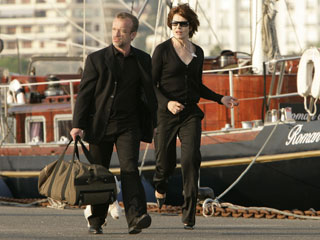Roman De Gare
by George Sax
A man and two women

Somewhere around the midway point in Claude Lelouch’s Roman De Gare, a character refers to Balzac’s The Human Comedy, the famous French writer’s omnibus title for much of his sprawling, multifarious body of fictional and nonfictional work. Sometime afterward, the same man remarks to a woman, “I will be the author, you will be the drama,” a remark attributed to Balzac which here seems to allude to the business of these two: He is the ghost writer of a number of spectacularly successful novels published under her name.
Balzac’s exploration of the pulsing, teeming human life around him doesn’t seem to have much to do with this very uneven, irony-infused little melodrama, although Lelouch does cram the opening minutes with so many plot setups—I counted eight—that the movie might seem a little Balzacean in its density and narrative scope.
Before very long, however, Lelouch—who both wrote and directed—settles down to concentrate primarily on one encounter between two people, Pierre (Dominique Pinon), a motorist whose identity is playfully and suspensefully up in the air, and a woman (Audrey Dana) whose fiancee leaves her stranded at a highway rest stop. The consequence of Pierre’s offer of assistance is that he assumes the role of her absent boyfriend to abet her in concealing her predicament from her family. The scenes at her family’s Alpine home are a warmly humorous interlude before Lelouch turns to darker, more menacing matters, including literary fraud and suspicions of murder. These revolve around Pierre’s professional and personal relationship with Judith Ralitzer (Fanny Ardant), the ostensible author of the potboiler novels he has been writing for her.
In much of its first half, Roman De Gare has a certain amusing, and self-amused, cleverness, as Lelouch keeps some measure of tension and wit simmering together, but by somewhere around that Balzac quote the veteran filmmaker seems to be trying to create a more portentous incisiveness that neither he nor his movie can sustain.
Since A Man and a Woman over forty years ago, Lelouch has been known as a packager of glinting, stylishly sleek cinematic ambiance. He is close in birth to the Nouvelle Vague directors and critics, but he wasn’t really a part of it. He’s more of a throwback to the older cinematic tradition the young 1950s and 1960s rebels were challenging, though he lacks the traditionalists’ thematic seriousness and aesthetic sturdiness. When he plays with ideas of identity, betrayal, and art in this movie, they come across as clumsy posturing of a particularly Gallic sort.
The title alludes to so-called “train station stories,” the kind of popular fiction purchased at airports and other transportation depots for vacation reading. Lelouch jokes a couple of times about this genre, but it’s a little self-conscious, and his own efforts in this movie to escape generic superficiality turn Roman De Gare into a tonally inconsistent and clumsy vehicle.
Watch the trailer for "Roman De Gare"
blog comments powered by Disqus
|
Issue Navigation> Issue Index > v7n26: What Will The Market Bear? (6/26/08) > Film Reviews > Roman De Gare This Week's Issue • Artvoice Daily • Artvoice TV • Events Calendar • Classifieds |









 Current Issue
Current Issue